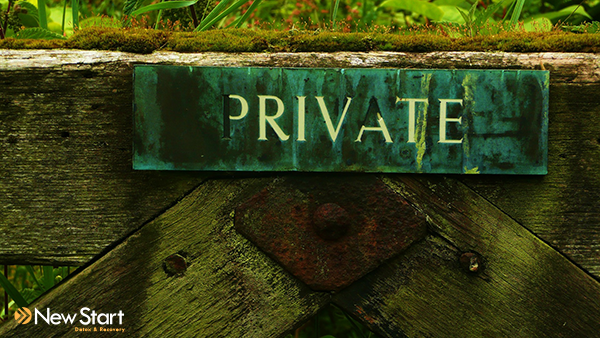Setting boundaries are important in everyone’s life. But sometimes, it’s hard to set boundaries when you’ve never had them. People who grew up in tough households might not have boundaries because they lived in a strict and uncomfortable environment. You might not have boundaries because you were glued to your drug of choice and it was a blurry time. There can be many reasons why boundaries weren’t set. But now – you’re in recovery, or you’re fully capable of your life and body, and it’s time to start setting boundaries.

Healthy and Unhealthy Boundaries
○ Honoring your own decisions, beliefs, and thoughts.
○ Taking responsibility for everything you do and say.
○ Realizing that you are in charge of you, you define yourself.
○ Respectfully sharing your thoughts and ideas to others.
○ Telling someone what to do or think.
○ Sacrificing or lying to others about your beliefs to please others.
○ Pressuring people to believe what you believe.
○ Taking responsibility for someone else’s feelings or actions.
Setting Boundaries
- Consider your worth.
We might have many regrets and disappointments from our past, but it’s important to move forward from it. Discover our worth, understand ourselves more, and regain self-esteem. Once we have confidence and self-esteem, it will be easier setting boundaries. What we did is not who we are. We are not bad people because of our addiction. - Self-awareness is important.
When we’re in recovery, we might attend AA meetings, see some speakers, meditate, or pray. Whatever we do to make us happy and rejoined, we need to continue doing. Don’t hold back or try pleasing others when it means missing out on something important to you. Recovery should always be our priority, and if we take an hour out of the day to pray, or do yoga, keep that streak going. It’s okay to say “no.” to others if it’s disrupting our peace in recovery. - Stay true to your emotions.
It’s easy to become flustered or lash out when something doesn’t go right. In order to set proper boundaries for ourselves, we should allow others to have proper boundaries as well. Instead of getting angry or lashing out at someone, we should be civil and respectful to them. If something is eating us up and we need to talk about it, counselors or close friends/family are good people to talk to. - Limit yourself accordingly.
Setting limits is important because we want others to respect our recovery. If we get invited Saturday night to a bar, then we should kindly decline if we’re not ready. If a friend asks us for a movie night Tuesday but we arranged a call to our sponsor, we should kindly decline. Everyone should have limits, and we should speak up if it’s something we can’t do or attend to. - Your boundaries are important.
Boundaries should be taken seriously. Just like how we’d respect someone else’s boundaries, they need to respect ours. If we keep getting bombarded with questions or invitations that are interfering with our current schedule, then we need to speak up. And if that person doesn’t understand and keeps pressuring it on us, we should distance ourselves from them. We are important and our recovery is important.

If you or someone you know is going through addiction, you’re not alone. Please call us at 855-737-7363 for a personal assessment. Your insurance could cover treatment.

